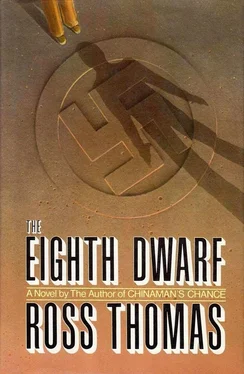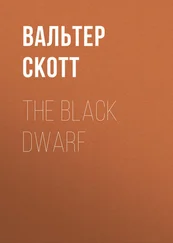Meyer nodded.
“Oh, he’ll go to Bonn all right.”
“What makes you so sure?”
“He has a list, doesn’t he? Sort of a things-to-do list — although, in this instance, it’s a people-to-kill list.”
“Yeah, he’s got a list.”
“And he’s German, isn’t he?”
Again, Meyer nodded.
“Did you ever see a German who, given a list of things to do, didn’t start at the top and work his way right down to the bottom? They are, Lieutenant, a most methodical people. It’s one of their primary virtues, provided that they have any virtues at all.”
“Oppenheimer’s a Jew.”
“But he’s also a German, my boy. He has his little list of things to do, people to kill. He’s started at the top and he’ll work his way down right to the bottom.”
“Unless somebody stops him.”
“Oh, I’ll stop him all right,” Major Baker-Bates said. “I’ll stop him in Bonn.”
Some twenty kilometers east of the Opel plant, the UNRRA Ford sedan turned in to the dairy farm. At the wheel was Heinrich, the butler-chauffeur and former caterer of Nazi social affairs in Berlin. His two passengers were Jackson and the dwarf. In the trunk of the car were fifty cartons of American cigarettes.
The farmhouse was built of reddish stone with a slate roof, as was the dairy barn, which was attached to it at a right angle. In the middle of the barnyard — and in Jackson’s opinion, far too close to the house — was a huge, steaming pile of manure.
“Let me guess,” Jackson said, nodding at the manure pile. “He’s got it hidden under that.”
The dwarf wrinkled his nose. “It’s a sign of prosperity, you know.”
“He must be a very rich man.”
“I will bring him,” Heinrich said, and got out of the car. Skirting carefully around the manure pile, he went up to the farmhouse and banged on its door with a fist. The door was opened a suspicious inch or two. Heinrich said something, the door opened wider, and the farmer came out.
He was a stocky, thick-waisted man of about fifty dressed in rubber boots and stained, dirty green coveralls. On his head was a shapeless black felt hat, and under it his face wore the wary, careful expression of a peasant who’s convinced that he’s about to be cheated. His eyes were small, blue, and cunning, the eyes of a skilled bargainer. Jackson decided that he would let the dwarf do all the dickering. The dwarf was good at it.
Jackson and Ploscaru got out of the car, but no introductions were made. The farmer stared at them a moment, especially at Ploscaru; grunted; and jerked his head in the direction in which he intended to lead them. He moved off, and the three men fell in behind.
“Why all the mystery, Nick?” Jackson said as they followed the fanner around toward the back of the barn.
“It’s not a mystery, it’s a surprise,” Ploscaru said. “Everybody likes surprise.”
“I don’t.”
“You’ll like this one.”
In back of the barn, the farmer stopped at a crude shed without walls that apparently had been erected to afford some protection to a four-foot-high stack of hay. All there was to the shed was its plank roof and the four poles that supported it.
The farmer picked up a rake and started pulling the hay down and to one side. The hay was only a few inches deep on top. Underneath it was a stained, patched canvas that covered something. When most of the hay was gone, the farmer peeled away the canvas, and Jackson said, “Sweet Jesus!”
It was red, and it had two bullet holes through its windshield. A leather strap was buckled around its immense hood. The radiator cap was adorned with a three-pointed star.
Jackson looked at the dwarf, who was beaming. “Isn’t it beautiful?” Ploscaru said.
“It’s a monster,” Jackson said.
“Are you familiar with this particular model, Herr Doktor?” asked Heinrich, obviously anxious to serve as docent.
“It’s a Mercedes,” Jackson said.
“Ach, but what a Mercedes. It’s the SKK 38-slash-250, designed, as you know, by Dr. Porsche. It has the 7.069-liter engine and is supercharged, as you can see. Horse-power, I would say, around 200. It’s supercharged by the Roots-type double-vane blower, and—”
“Tell me about the bullet holes,” Jackson said.
“Ach, those. Well, perhaps we should let its proprietor tell you about those.” He turned to the farmer. “He wants to know about the bullet holes in the windshield.”
The farmer spat into some hay and shrugged. “What is there to know? It was your planes that did it.”
“My planes?” Jackson said.
“Well, your plane, then. There was only one. An American fighter. He came in low and got him through the head.”
“Who?”
“The Colonel.”
“What kind of colonel?”
“An SS colonel, except that he was no longer in uniform then. It was right after Frankfurt fell to the Americans. The Colonel was trying to get to Switzerland, or so he said before he died. I buried him over there.” He pointed with his chin to a grassy mound of earth under a plane tree.
“And kept his car,” Jackson said.
The farmer shrugged again. “Who’s to say it was his car? He was a deserter. He probably stole it.”
“But you want to sell it now?” Ploscaru said.
The farmer looked up at the sky. “I might.”
“You have the papers, of course.”
The farmer quit looking up at the sky and frowned. “No papers.”
“Well, that does present certain kinds of problems.”
“What kind of problems?”
“Obviously, for a car with paper there is one price. But for a car with no papers — well, naturally, there must be another price.”
“Especially for one owned by an SS colonel who only drove it to the gas chamber on Saturday nights,” Jackson said in English.
The farmer glared. “What did he say?”
“I said that it probably uses a lot of gasoline. Probably two kilometers to the liter. Maybe three.”
“It has a big tank. Besides,” the fanner continued with another shrug, “you’re an American. Gasoline is no problem for you.”
“So how much are you asking for this twelve-year-old contraption?” Ploscaru said.
“I will not take marks.”
“All right, no marks.”
“Either cigarettes or dollar.”
“How much in dollars, then?”
The farmer couldn’t keep the craftiness and greed from spreading across his face. “Five hundred dollars.”
Ploscaru nodded several times as though he found the price perfectly reasonable. “That’s with the papers, of course.”
“I told you. No papers.”
“Oh, I see. Then your price without papers must be around two hundred dollars, right?”
“Wrong,” the farmer said. “It is an unusual car, a rare model. Anyone would pay at least four hundred dollars for it.”
“True, true,” Ploscaru said. “They might pay that much if there were papers to go with it and if there weren’t two bullet holes in its windshield. Think of the questions that will be asked when one goes to get the glass replaced.”
“Perhaps three-fifty,” the farmer said.
“Three hundred, and we’re taking a terrible risk.”
“Done,” the farmer said, and held out his hand. Ploscaru shook it, then turned to Heinrich. “How much are cigarettes bringing on the black market today, Heinrich?”
“Ten dollars a carton, Herr Direktor,” he said automatically.
“Thirty cartons?” Ploscaru said to the farmer.
He nodded. “Thirty cartons.”
“You forgot to ask him one thing,” Jackson said.
Ploscaru looked up. “What?”
“Does it run?”
“It runs,” the farmer said. “It runs very fast.”
The narrow road was long, straight, and free of traffic. When the speedometer reached 70 kilometers per hour, Jackson jammed the accelerator to the floor, the supercharger cut in with a howl, and the big open roadster leaped forward as though shot from some immense rubber band.
Читать дальше












